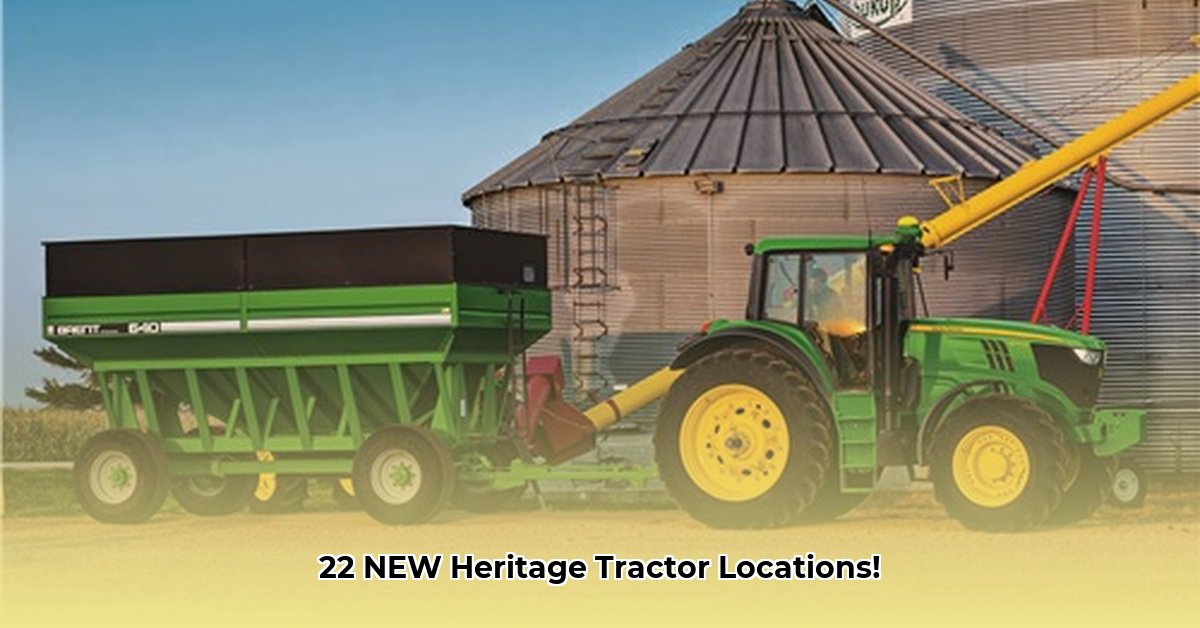
Heritage Tractor's Missouri Expansion: A Statewide Agricultural Footprint
Heritage Tractor, a prominent John Deere dealership, has significantly expanded its presence in Missouri, opening 22 new locations across the state. This strategic move aims to enhance accessibility to new and used John Deere equipment, parts, and service for Missouri farmers. While the company emphasizes a commitment to sustainable agriculture, concrete details regarding specific initiatives remain limited. This expansion, including a key location in Clinton, MO, promises to reshape the agricultural landscape across the state. For more information on specific locations, visit the Westphalia dealership page.
Enhanced Sales Strategies: A Multifaceted Approach
Heritage Tractor's expansion strategy is multifaceted. The company is offering several sales incentives, including seasonal discounts—up to 33% off HeritageGard services, 10% off oil changes, and 15% off agricultural filters—to attract customers. Additionally, a "Hot List" of used equipment caters to budget-conscious farmers. A significant focus on parts and service, notably through the HeritageGard program, aims to build strong customer relationships and extend equipment lifespan. This comprehensive approach targets farmers of all sizes and budgets.
Sustainability: An Indirect but Significant Contribution
While detailed information on Heritage Tractor's direct sustainability initiatives is currently unavailable, their emphasis on parts and service indirectly supports sustainable practices. By extending equipment lifespan through maintenance and readily available parts, they reduce waste and lessen the environmental impact associated with constant equipment replacements. This represents a significant step toward environmental responsibility, although further transparency regarding proactive sustainability efforts is anticipated.
Navigating the Competitive Landscape: Challenges and Opportunities
Heritage Tractor operates within a competitive agricultural equipment market, facing challenges like supply chain disruptions and intense competition from other dealerships. The company's ambitious expansion underscores its confidence in capturing a greater market share in Missouri. Their success will depend on their ability to effectively manage logistics, maintain competitive pricing, and guarantee a consistent supply of parts and equipment to meet the demands of its expanding customer base. Will this ambitious expansion be sustainable in the long term? Only time will tell.
Impacts on Stakeholders: Short-Term and Long-Term Perspectives
The expansion will have diverse short-term and long-term repercussions for various stakeholders:
Short-Term Impacts:
- Heritage Tractor: Increased sales, market reach, stronger customer relationships, and enhanced brand reputation.
- Farmers: Improved access to equipment, services, and potentially more competitive pricing.
- John Deere: Wider market penetration in Missouri, increased sales, and a strengthened brand partnership.
Long-Term Impacts:
- Heritage Tractor: Success hinges on strategic partnerships, investments in sustainable technologies, and potential further expansion.
- Farmers: Access to a wider range of equipment and services, including sustainable farming solutions, and potentially improved financing options.
- John Deere: Enhanced opportunities for collaboration in R&D, improved data sharing, and joint ventures promoting sustainable practices.
Potential Risks and Mitigation Strategies
Several challenges could impact Heritage Tractor's expansion:
- Supply chain disruptions: Mitigation strategies include diversifying suppliers, building strong supplier relationships, and strategic parts stockpiling.
- Competition: Differentiation through exceptional customer service, loyalty programs, and a robust marketing strategy are crucial.
- Economic downturns: Flexible pricing, cost optimization, and diversified revenue streams are essential for navigating economic fluctuations.
- Regulatory changes: Proactive monitoring of regulatory developments and engagement with industry associations are vital.
Conclusion: Expansion and the Future of Missouri Agriculture
Heritage Tractor's significant expansion, notably the addition of 22 new locations including the Heritage Tractor Clinton MO facility, represents a major investment in Missouri agriculture. While the company's direct contributions to sustainable agriculture are still developing, their broad reach, sales strategies, and indirect environmental benefits position them as a key player. However, their long-term success will depend on their ability to overcome challenges, innovate, and adapt to the dynamic agricultural landscape.